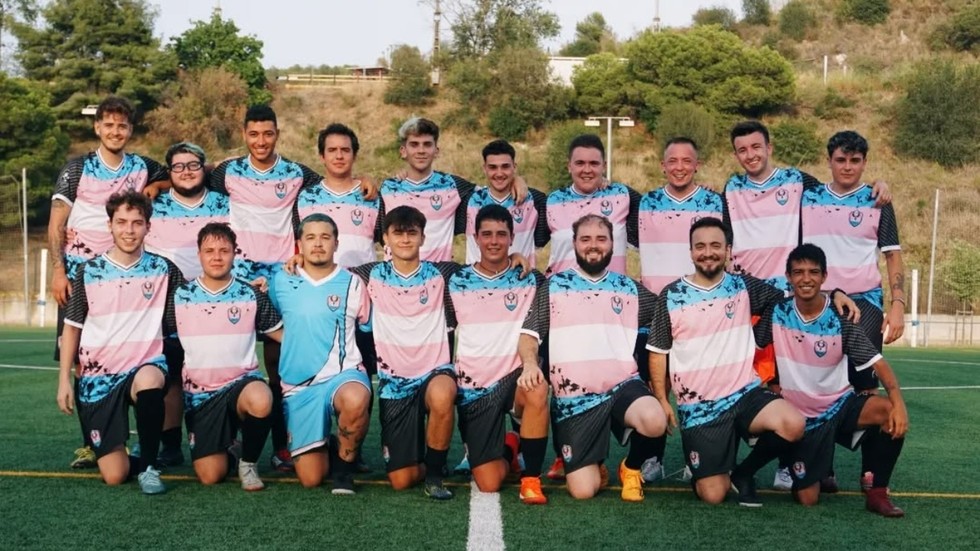Fenix FC has marked a significant milestone in European sports history as the first all-transgender soccer team to join a federation. Based in Sant Feliu de Llobregat, a suburb of Barcelona, this football team is composed solely of transgender men. According to reports from Reuters, the squad officially began competing in the fifth division of men’s football in Catalonia, making it a groundbreaking inclusion within the framework of European football. The team, named Fenix FC, draws its inspiration from the mythical phoenix, symbolizing rebirth and resilience. Their journey into competitive soccer began on September 21, when they played their first match, unfortunately facing a heavy defeat of 19-0. However, the team’s aspiration was not limited to winning but envisioned creating an inclusive space for transgender individuals in sports.
The formation of Fenix FC was largely motivated by the experiences of its founder, Hugo Martinez, who faced challenges in traditional gendered teams. After beginning his transition to a male identity through hormone therapy, he found himself expelled from a women’s team, sparking the idea of a dedicated team for transgender men. This necessity for a safe and welcoming environment became central to the club’s mission, highlighting the often difficult intersection of sports, gender identity, and acceptance. In many regions, transgender individuals may struggle to find a supportive community within sports, which can be both exclusionary and hostile. Hence, Fenix FC aims to address this gap by creating a team specifically for trans men, allowing them to participate in sports while feeling authentic and accepted.
The culture fostered within Fenix FC is described by its captain, Luke Ibanez, as more than just a soccer team; he refers to it as a ‘family’ and a ‘safe space.’ Ibanez articulated his fears of potential exclusion and violence on a traditional men’s team, indicating that the environment created within Fenix FC offers freedom of expression and self-identity. The combination of camaraderie and shared experience among the players contributes to a supportive atmosphere, essential for their emotional and psychological well-being. Such environments are crucial for many athletes who identify as LGBTQ+, especially amidst the pressures and expectations of competitive sports. The creation of spaces like Fenix FC reinforces the idea that sports can be inclusive, thus providing hope for many who face discrimination in other spheres of life.
Spain’s progressive legislative landscape has facilitated the advancement of LGBTQ+ rights, contributing to the emergence of teams like Fenix FC. In late 2022, new laws were enacted that allow individuals to legally change their gender without the necessity for extensive medical evaluations, thereby promoting greater inclusion for transgender persons across various sectors, including sports. This legislative change reflects a broader societal acceptance of transgender issues, encouraging a cultural shift towards inclusivity. Within the context of soccer, the Catalan Football Federation has embraced a mixed-gender approach to their leagues, which allows individuals of all genders to compete based on their self-identified gender rather than strictly on their assigned sex at birth. This progressive move has provided a foundation for Fenix FC’s establishment and reflects an evolving attitude within sports organizations.
Despite their overwhelming loss in their first match, Fenix FC’s participation represents a crucial first step in advocating for transgender representation within competitive sports. Their inclusion sends a powerful message about the importance of diversity in soccer, inspiring others to embrace and support the idea that anyone should have the opportunity to participate in sports regardless of gender identity. The narrative surrounding Fenix FC emphasizes the importance of acceptance and understanding within athletics and underlines the need to challenge traditional norms that dictate who can participate in which sports. While their competitive journey has just begun, the players embody a message of resilience and hope for many aspiring athletes who identify as transgender.
In conclusion, Fenix FC’s story is more than just about soccer; it is a narrative about identity, acceptance, and the relentless pursuit of equality in sports. As the first all-trans soccer team in Europe, they have not only reclaimed their space within the sporting community but also set a precedent for future generations of athletes. The efforts of Hugo Martinez and his team reflect a significant cultural shift towards acceptance and respect for all identities within sports. Their journey emphasizes that participation in sports can extend beyond mere competition; it can also be a powerful vehicle for change and representation. As they continue to compete and advocate for themselves and others, Fenix FC is poised to inspire wider societal changes and foster greater acceptance and inclusion in the world of sports.

